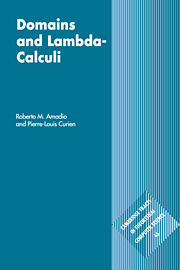
-
Select format
-
- Publisher:
- Cambridge University Press
- Publication date:
- 05 November 2011
- 02 July 1998
- ISBN:
- 9780511983504
- 9780521622776
- 9780521062923
- Dimensions:
- (228 x 152 mm)
- Weight & Pages:
- 0.954kg, 504 Pages
- Dimensions:
- (228 x 152 mm)
- Weight & Pages:
- 0.758kg, 504 Pages
You may already have access via personal or institutional login
Book description
This book describes the mathematical aspects of the semantics of programming languages. The main goals are to provide formal tools to assess the meaning of programming constructs in both a language-independent and a machine-independent way, and to prove properties about programs, such as whether they terminate, or whether their result is a solution of the problem they are supposed to solve. In order to achieve this the authors first present, in an elementary and unified way, the theory of certain topological spaces that have proved of use in the modelling of various families of typed lambda calculi considered as core programming languages and as meta-languages for denotational semantics. This theory is known as Domain Theory, and was founded as a subject by Scott and Plotkin. One of the main concerns is to establish links between mathematical structures and more syntactic approaches to semantics, often referred to as operational semantics, which is also described. This dual approach has the double advantage of motivating computer scientists to do some mathematics and of interesting mathematicians in unfamiliar application areas from computer science.
Reviews
Review of the hardback:‘… extremely useful as a reference for classical results and techniques in general domain theory, very balanced in the treatment of mathematical properties of domains and their operational motivations and applications, and always deep in the choice of topics and in unravelling the connections between them.’
Felice Cardone Source: Science of Computer Programming
Review of the hardback:‘This is an excellent, thorough monograph … a rich and comprehensive source of information, it is very useful as a reference to classical results in domain theory and lambda calculus.’
Paula G. Severi Source: Zentralblatt MATH
Contents
Metrics
Altmetric attention score
Full text views
Full text views help Loading metrics...
Loading metrics...
* Views captured on Cambridge Core between #date#. This data will be updated every 24 hours.
Usage data cannot currently be displayed.
Accessibility standard: Unknown
Why this information is here
This section outlines the accessibility features of this content - including support for screen readers, full keyboard navigation and high-contrast display options. This may not be relevant for you.
Accessibility Information
Accessibility compliance for the PDF of this book is currently unknown and may be updated in the future.


